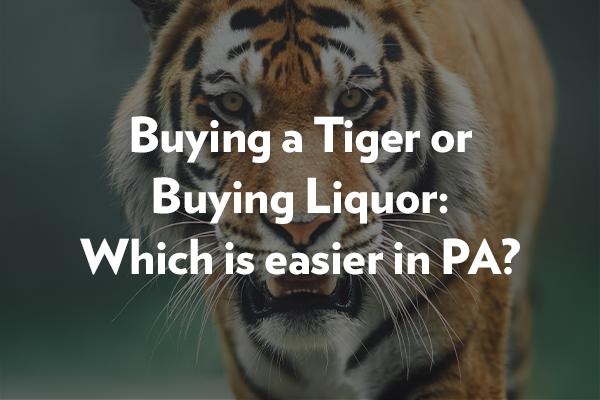Commentary

Is it Easier to Be Tiger King Than Buy Booze in Pennsylvania?
While COVID-19 sweeps the globe and governments mandate business closures and stay-at-home orders, people are turning to comforts of online streaming. The latest must watch? Netflix’s docu-series Tiger King. For Pennsylvanians, mixing up their favorite cocktail and following the adventures of an off-the-wall zoo owner named Joe Exotic might be easier said than done. State-run liquor stores shut down weeks ago and we have more red tape around the sale of alcohol than selling literal tigers.
One of the most surprising elements of Tiger King—apart from its incredible popularity—was the relative ease of purchasing a tiger. Viewers were shocked when they heard the main protagonist, Joe Exotic, exclaim that each newborn tiger was worth only $2,000. While not exactly spare change, many pedigreed dogs come with a higher price tag, and less notoriety.
Additionally, these tigers were delivered directly to the buyer straight from Joe Exotic’s zoo located in Oklahoma. Talk about service. Former employees recalled how they would drive these magnificent cats across the country and bring them to their new owners.
When you compare that to a simple bottle of your favorite liquor, it’s a cake walk. And that’s thanks to the state-run Pennsylvania Liquor Control Board.
Following the closure of stores due to the COVID-19 outbreak, the state-run liquor monopoly rolled out limited online sales, but that plan quickly crashed and burned. The website was unable to keep up with demand and as a result, PLCB has taken to implementing a lottery-like randomization to determine who is able to even access the website.
If you are hoping to gain more insight into this “randomization” algorithm, you’re out of luck. The PLCB refuses to offer additional information in order to maintain the “integrity of protections” around the site. Could it be any more dangerous than a 400-pound exotic cat? This randomization and limited capacity means that many Pennsylvanians are simply unable to buy liquor on the state store’s website—only about 1 in 330 are successful.
Naturally, this led many residents to flee to other states to make purchases. Stores in states like New Jersey are struggling to keep up with the out-of-state demand, and other states are turning away Pennsylvania residents due to concern of overcrowding. Both Ohio and West Virginia are refusing to sell alcohol to Pennsylvanian residents in counties that boarder to the state and Delaware is patrolling their roadways for non-essential travelers. Are we now back in the days of Prohibition?
Even before business closures related to COVID-19, though, purchasing alcohol in our state was no easy task. The website debacle is just the latest in a long line of PLCB boondoggles. With the state now offering limited curbside pickup—with restrictions on stores, bottles, and number of orders—that list will likely continue to grow.
Thankfully, there is a path forward and it starts with doing away with the state’s monopoly, through a franchise model. Senate Bill 548 allows for privately operated wine and liquor stores that are licensed through the PLCB.
Another option is full privatization. When Washington state decided to privatize the sale of liquor in 2012, the results were favorable for consumers in terms of convenience, selection, and price.
In our state, that kind of relief can’t come soon enough. Over the years the PLCB has become a financial liability to taxpayers, now $1 billion in the red.
The COVID-19 crisis has revealed that the PLCB is a relic of the past. Supporting a system that literally drives revenue to other states makes us all losers, and now is the time to reform. Switching to private management would enable stores to be more responsive to consumer demand and allow the PLCB to focus on safety.
Afterall, buying liquor should at least be as easy as buying a tiger.